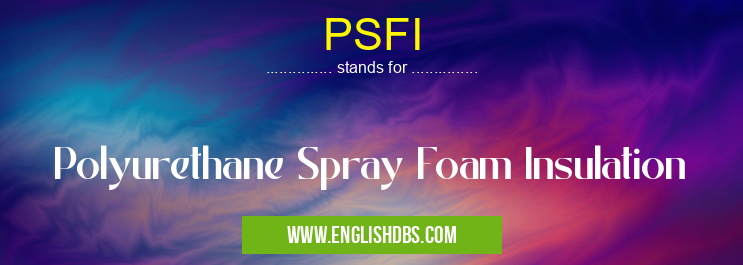What does PSFI mean in UNCLASSIFIED
Polyurethane Spray Foam Insulation (PSFI) is a type of insulation material used in construction to improve a building's energy efficiency and thermal comfort. It is a versatile material that can be applied to various surfaces, including walls, roofs, and floors.

PSFI meaning in Unclassified in Miscellaneous
PSFI mostly used in an acronym Unclassified in Category Miscellaneous that means Polyurethane Spray Foam Insulation
Shorthand: PSFI,
Full Form: Polyurethane Spray Foam Insulation
For more information of "Polyurethane Spray Foam Insulation", see the section below.
Meaning of PSFI
PSFI stands for Polyurethane Spray Foam Insulation. It is a combination of two components:
- Polyurethane: A synthetic polymer that provides the foam's structural strength and flexibility.
- Spray Foam: A method of applying the polyurethane mixture as a liquid that expands and hardens into foam.
Benefits of PSFI
- Excellent Insulation: PSFI has a high R-value, which measures its ability to resist heat flow. It effectively reduces heat loss in winter and heat gain in summer, leading to significant energy savings.
- Air Sealing: PSFI forms a continuous and airtight seal, preventing air infiltration and drafts. This reduces energy consumption and improves indoor air quality.
- Moisture Resistance: PSFI is highly moisture-resistant, preventing moisture penetration and the growth of mold and mildew.
- Durability: PSFI is a durable material that can withstand extreme temperatures and environmental conditions, ensuring long-term performance.
Applications of PSFI
- Residential Buildings: Walls, roofs, and floors
- Commercial Buildings: Offices, warehouses, and industrial facilities
- Agricultural Buildings: Barns, greenhouses, and livestock shelters
Essential Questions and Answers on Polyurethane Spray Foam Insulation in "MISCELLANEOUS»UNFILED"
What are the benefits of using PSFI?
PSFI provides excellent insulation, reducing heat loss and energy consumption. It also acts as a sound barrier, improving indoor comfort. Additionally, PSFI is resistant to moisture, mold, and pests, promoting a healthier indoor environment.
What types of surfaces can PSFI be applied to?
PSFI can be applied to a wide range of surfaces, including wood, metal, concrete, and drywall. It is commonly used in residential, commercial, and industrial applications, including walls, ceilings, roofs, and crawl spaces.
Is PSFI safe for use?
PSFI is considered safe when installed by certified professionals using proper safety equipment. The materials used in PSFI are tested and approved by regulatory agencies. Once cured, PSFI is non-toxic and poses no health risks.
What is the lifespan of PSFI?
PSFI has a long lifespan of approximately 50 years or more when installed properly. It is durable and resistant to degradation, providing lasting insulation and protection.
How is PSFI installed?
PSFI installation involves spraying a mixture of liquid resins onto the surface to be insulated. The resins expand and harden within seconds, creating a seamless and continuous layer of insulation. Specialized equipment and trained professionals are required for proper installation.
What factors affect the cost of PSFI insulation?
The cost of PSFI insulation can vary based on factors such as the size of the area to be insulated, the thickness of the insulation required, and local labor rates. Consulting with certified insulation contractors can provide an accurate estimate.
Final Words: PSFI is an advanced insulation material that offers exceptional energy savings, air sealing, moisture resistance, and durability. Its versatility and ease of application make it a cost-effective solution for improving the thermal performance and indoor environment of various building types.
PSFI also stands for: |
|
| All stands for PSFI |
